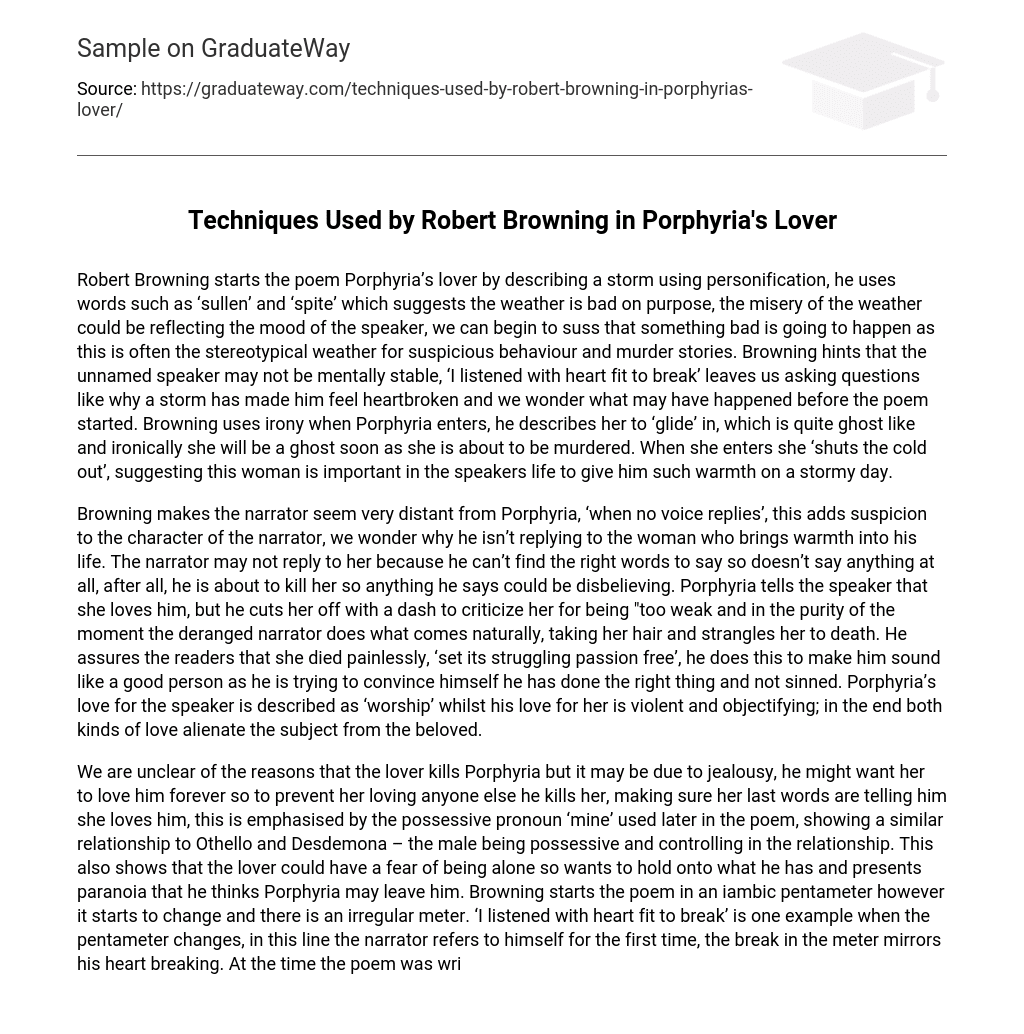Robert Browning starts the poem Porphyria’s lover by describing a storm using personification, he uses words such as ‘sullen’ and ‘spite’ which suggests the weather is bad on purpose, the misery of the weather could be reflecting the mood of the speaker, we can begin to suss that something bad is going to happen as this is often the stereotypical weather for suspicious behaviour and murder stories. Browning hints that the unnamed speaker may not be mentally stable, ‘I listened with heart fit to break’ leaves us asking questions like why a storm has made him feel heartbroken and we wonder what may have happened before the poem started. Browning uses irony when Porphyria enters, he describes her to ‘glide’ in, which is quite ghost like and ironically she will be a ghost soon as she is about to be murdered. When she enters she ‘shuts the cold out’, suggesting this woman is important in the speakers life to give him such warmth on a stormy day.
Browning makes the narrator seem very distant from Porphyria, ‘when no voice replies’, this adds suspicion to the character of the narrator, we wonder why he isn’t replying to the woman who brings warmth into his life. The narrator may not reply to her because he can’t find the right words to say so doesn’t say anything at all, after all, he is about to kill her so anything he says could be disbelieving. Porphyria tells the speaker that she loves him, but he cuts her off with a dash to criticize her for being “too weak and in the purity of the moment the deranged narrator does what comes naturally, taking her hair and strangles her to death. He assures the readers that she died painlessly, ‘set its struggling passion free’, he does this to make him sound like a good person as he is trying to convince himself he has done the right thing and not sinned. Porphyria’s love for the speaker is described as ‘worship’ whilst his love for her is violent and objectifying; in the end both kinds of love alienate the subject from the beloved.
We are unclear of the reasons that the lover kills Porphyria but it may be due to jealousy, he might want her to love him forever so to prevent her loving anyone else he kills her, making sure her last words are telling him she loves him, this is emphasised by the possessive pronoun ‘mine’ used later in the poem, showing a similar relationship to Othello and Desdemona – the male being possessive and controlling in the relationship. This also shows that the lover could have a fear of being alone so wants to hold onto what he has and presents paranoia that he thinks Porphyria may leave him. Browning starts the poem in an iambic pentameter however it starts to change and there is an irregular meter. ‘I listened with heart fit to break’ is one example when the pentameter changes, in this line the narrator refers to himself for the first time, the break in the meter mirrors his heart breaking. At the time the poem was written the target audience, Victorian moralists, were about repressing sexuality, for a woman to acknowledge she had sexual desires was considered sinful, so therefore they would have been shocked reading this poem yet also intrigued as to how and why she feels these sexual desires that Porphyria admits to having.





